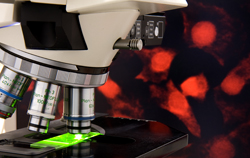Accelerated radiation therapy investigated
For differentiation and development in higher organisms to follow the correct path, apoptosis must occur in the correct cells with flawless timing. Scientists have harnessed this phenomenon of programmed cell death to bring about the destruction of tumour cells. In some cases however, defects in the many molecular cascades leading to apoptosis can lead to resistant tumours. In response to this, research by the EU project Impaled focused on elucidating the molecular mechanisms behind cell death. The key family of p53 proteins came under scrutiny together with their relationship with the mitochondrion. Through an in-depth knowledge of the pathways and molecular interplay, the aim was to develop new therapies for tumour resistance. One project team at the Cancer Centre Karolinska in Sweden investigated the potentially different effects of low and high Linear energy transfer (LET) ionising radiation. The scientists postulated that defects in the signalling mechanisms after DNA damage when p53 is active may be responsible for resistance. Whether high or low LET radiation had an effect on these molecular messages was investigated. Using a cell line derived from lung carcinoma, the researchers first showed that when using low LET radiation the action of two sets of proteins involved in apoptosis was impeded. With application of high LET radiation (accelerated ions) however, the DNA strand breaks were observed to be more complex and there was increased apoptotic signalling. Following up on this line of research, the scientists investigated pro-apoptotic proteins Bax and Bak and a group of stress-activated kinases. The response of both families of proteins was different depending on whether low or high LET radiation was applied. Applications of the results of this research are potentially wide. To fulfill the aims of the Impaled project and find novel therapies for tumour resistance is the most obvious benefit. At a time when the incidence of malignant melanoma is increasing, advanced research into the effects of radiation would also be invaluable to medical and pharmaceutical interests.







